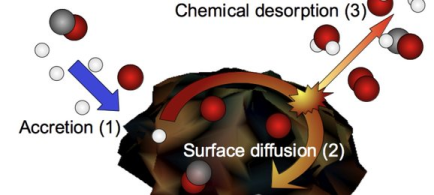Experimental evidence for major impact of micron-sized dust particles in the universe
A French/Dutch team of astronomers, including Stéphanie Cazaux from the Kapteyn Institute, University of Groningen, has proved via laboratory tests that molecules in microscopically small dust particles in space can be directly transformed into gas. These findings may have important consequences for theories on the chemical structure of the universe and the way stars are formed. The findings were published online in Nature Scientific Reports on February 26th.

Article: Dulieu, F. et al. How micron-sized dust particles determine the chemistry of our Universe. Sci. Rep. 3, 1338
http://www.nature.com/srep/2013/130226/srep01338/full/srep01338.html DOI:10.1038/srep01338 (2013)
More information:
Contact: Stephanie Cazaux, University of Groningen Kapteyn Institute
E-mail:
cazaux astro.rug.nl
More news
-
19 December 2025
Mariano Méndez receives Argentine RAÍCES award
-
18 December 2025
Why innovate, and for whom?
-
17 December 2025
Ben Feringa wins Feynman Prize
